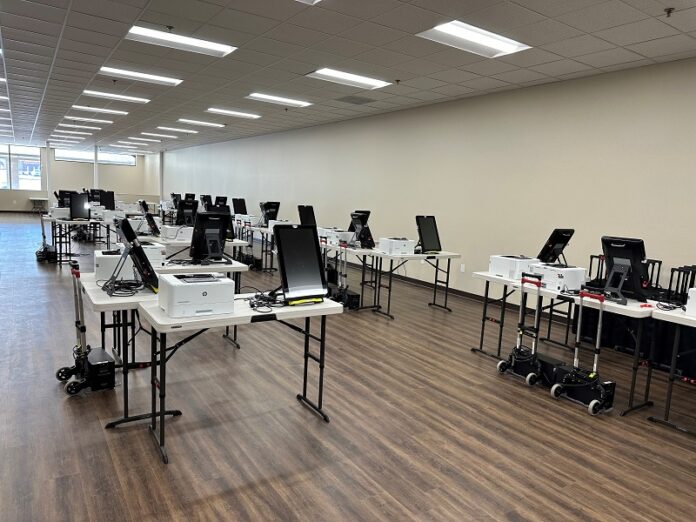
ATLANTA (Georgia Recorder) — For the first time since the post-2020 presidential election, Georgia Republican state lawmakers did not pass a bill during this year’s session that included controversial changes to the way votes are cast or tallied.
When Lt. Gov. Burt Jones sent senators home a little after 9 p.m. on April 4, it not only seemed to catch many senators off guard, but it also briefly left the House in disarray. The abrupt ending likely killed the main election bill’s chances in 2025, raising questions about what new rules could be in place in time for the 2026 election year highlighted by races for governor, U.S. Senate, attorney general and all 236 state legislative races.
The most significant GOP election bill for the session was among the dozens of bills left in limbo. It will still be active when lawmakers return for the second half of the two-year legislative cycle next January.
The House adjourned before legislators were presented with a substitute version of House Bill 397 that cleared the Senate after the addition of several proposals such as expanding State Election Board powers and banning Georgia from participation in a multi-state voter rolls data sharing partnership. Instead, the House passed a resolution on the last day of the 2025 Legislature creating a study committee that will examine election rules later this year.
The 2026 legislative session will begin with the House retaining control over SB 397 and Senate Bill 214, which would give voters the option of filling out ballots with pencils or pens instead of using electronic voting machine touchscreens when they cast votes at polling stations.
The possibility of a switch to hand-marked paper ballots will be a topic later this year after House legislators created a study committee to review Georgia’s Dominion Voting System’s touchscreen system.
The Coalition for Good Governance is warning legislators they shouldn’t take further action to remove QR codes from being used in paper ballot tabulation.
“County election officials are now trapped,” coalition executive director Marilyn Marks said. “They are legally prohibited from using QR codes after July 1, 2026 — but given no money or direction from the state on how to comply — a tab that could be more than $70 million according to Secretary of State Brad Raffensperger. Any attempt to install new hardware and software would need to begin in early 2026, and funding and acquisition of equipment would be required this year.”
Sylvania Republican Sen. Max Burns led the Republican members of the committee to defer any consideration of hand-marked paper ballots until 2029. Burns has said the study committee this fall will begin planning out the transition to human readable text for paper ballots.
The transition has been deferred from QR codes to human readable text for paper ballots.
The possibility of a switch to hand-marked paper ballots will be a topic later this year after House legislators created a study committee to review Georgia’s Dominion Voting System’s touchscreen system.
Sylvania Republican Sen. Max Burns sponsored SB 214, which would allow voters to request ballots similar to absentee ballots when they visit a polling place during early voting or on an Election Day.
Leading up to Sine Die, the Coalition for Good Governance warned legislators against not taking further action to remove QR codes from being used in paper ballot tabulation.
“County election officials are now trapped,” coalition executive director Marilyn Marks wrote in a newsletter email. “They are legally prohibited from using QR codes after July 1, 2026 — but given no money or direction from the state on how to comply — a tab that could be more than $70 million according to Secretary of State Brad Raffensperger. Any attempt to install new hardware and software would need to begin in early 2026, and funding and acquisition of equipment would be required this year.”
Raffensperger has asked for legislators to implement a much less expensive software update instead of removing QR codes from ballots.
The Georgia Republican Party and right-wing election watchdog groups like VoterGa have pushed for state election changes that will give the controversial State Election Board more autonomy over election rulemaking and administrative independence from the secretary of state’s office. Three of the five board members are staunchly loyal to President Donald Trump.
Democratic lawmakers have objected to HB 397’s provision banning voters from dropping off absentee ballots on the final weekend before Election Day. Critics have also raised concerns about expanded election board rulemaking powers despite the bill proposing to prohibit rulemaking within 60 days of an election.
Another contested section of the bill is over the plan for the state to transition from participating in the Electronic Registration Information Center, an organization that currently provides two dozen states a database to help maintain accurate voter rolls.
“They claim the rolls are littered with the names of people who have moved from the addresses on their registrations and are no longer eligible to vote, but ignore that the evidence they point to is often insufficient under our laws to trigger removal of voters from rolls,” Atlanta Democratic Rep. Saira Draper wrote as the legislative session was down.
There will be a condensed window for next year for legislators passing new election rules that could be implemented in the time for a 2026 election cycle that begins with primaries in May.
Draper has been outspoken about her being dismayed by the recent majority GOP legislature passing election legislation to “assuage election denier concerns.
“We must always push back on narratives based on misinformation and fear-mongering,” she said.
The State Election Board is set to meet Monday to hire a new executive director







